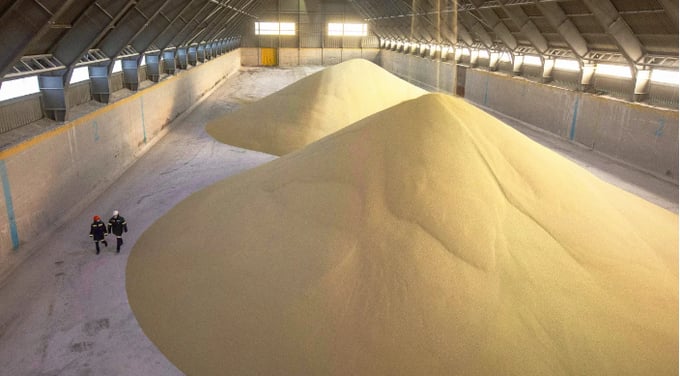November 26, 2025 | 10:33 GMT +7
November 26, 2025 | 10:33 GMT +7
Hotline: 0913.378.918
November 26, 2025 | 10:33 GMT +7
Hotline: 0913.378.918

Piles of phosphate fertilizer granules in a storage warehouse at a fertilizer plant in Cherepovets, Russia. Photo: Andrey Rudakov/Bloomberg/Getty Images
“We agree that the barriers to Russian grain and exports should also be removed. We support efforts to remove these barriers,” Çavuşoğlu said at a joint press conference with his Russian counterpart, Sergey Lavrov.
There is an understanding between the U.N. and Russia to ensure the export of Russian grain, fertilizers and ammonia, Çavuşoğlu reminded and said that “the agreements reached must be implemented” for continuing the Black Sea Grain deal.
The U.S. and the U.K. have taken some steps on the issue of payments, but the problem still persists, he added.
Lavrov, for his part, said Russia was excluded from the swift payment system and the Russian vessels cannot enter the ports, although neither fertilizer nor grain was on the sanction lists of the West against Russia.
The Russian minister warned that Moscow will question another extension of the grain deal if no further progress is achieved in removing obstacles to the export of Russian fertilizers and grain.
Having extended the deal for a second period of 120 days and “not finding any signs that someone can really solve these issues, weary of the conscience of those on whom it depends, we went for a slight escalation and welcome the resumption of this offensive only for 60 days,” he said.
“If there are no further benefits in removing obstacles to the export of products, we will consider whether this deal is necessary,” he added.
If necessary, Russia will work outside the framework of this initiative and “do this with Türkiye and with Qatar,” Lavrov noted.
Moscow wants any Ukraine peace talks to focus on creating a “new world order,” the Russian minister also said. “Any negotiation needs to be based on taking into account Russian interests, Russian concerns… It should be about the principles on which the new world order will be based,” he emphasized. Russia rejects a “unipolar world order led by ‘one hegemon,’” he added.
On the issue of the normalization process between Türkiye and Syria, Çavuşoğlu said Ankara hopes dialogue on Syria will continue in a “transparent and open” manner. “We will continue to be in close consultation with Russia for the normalization process with Syria,” he said.
“We know that not all issues can be settled in one meeting, in two meetings, we are realistic. We want this process to continue in a transparent manner. The dialogue needs to continue, it would be beneficial to continue the consultations by intensifying,” he said.
Çavuşoğlu also noted that they discussed the upcoming quadrilateral foreign ministers’ meeting, including Iran and Syria.
Asked about the election process in Türkiye, Lavrov said Russia never interferes in the internal affairs of other countries.
(SF)

(VAN) Brazil's COP30 presidency pushed through a compromise climate deal on Saturday that would boost finance for poor nations coping with global warming but that omitted any mention of the fossil fuels driving it.

(VAN) Poultry farmers in the UK have been warned that they could face one of the worst winters yet for bird flu.

(VAN) Prices of main-crop paddy have risen sharply, with jasmine rice hitting 16,100 baht per tonne — the highest level in years.

(VAN) In Brazil, FAO unveiled a series of reports and initiatives showing how sustainable agrifood systems are a solution to the climate crisis.

(VAN) With names like neodymium and dysprosium, rare-earth elements sound exotic — and their perceived scarcity has only added to the mystique.

(VAN) In a new study published in Trends in Biotechnology, researchers used a gene-editing technology called CRISPR to increase a fungus's production efficiency and cut its production-related environmental impact by as much as 61%- all without adding any foreign DNA.

(VAN) A top official in Beijing’s Cop delegation says China is committed to clean energy – but US’s absence is a problem.